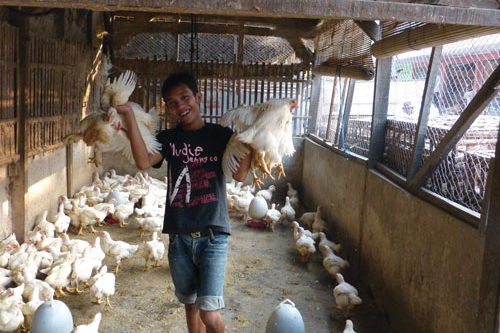Exploring the Nature of Pandemic Infectious Diseases at the Source
THE JAPAN INITIATIVE FOR GLOBAL RESEARCH NETWORK ON INFECTIOUS DISEASES (J-GRID)

In response to the worldwide threat posed by potential pandemic infectious diseases, AMED is supporting Japanese universities to establish collaborative research centers in countries where risk of infection is high through its J-GRID program. This allows researchers to gain vital access to patients, animal hosts, insect vectors and public health organizations directly affected by infectious diseases.
To date, seven centers have been established in Asia in addition to two in Africa, where Japanese researchers work alongside local researchers to target influenza, dengue fever, multidrug-resistant bacteria and serious diarrhea.
One such study, conducted in collaboration with the Kobe University Graduate School of Medicine and Airlangga University in Indonesia, provided evidence of a highly pathogenic avian influenza A(H5N1) infection among live-poultry market workers, who displayed no symptoms.
AMED hopes findings such as these will provide a valuable scientific foundation for determining domestic and international measures to prevent or control pandemic outbreaks caused by viruses of avian influenza A(H5N1) origin.
As the project continues, AMED will seek to strengthen its collaborative research network in Japan and abroad, and further develop research infrastructure through the creation of a comprehensive database of its study findings.
 Concept
Concept
Understand how pathogens of infectious diseases are maintained in the wider environment, how they gain access to human populations and how they are propagated in humans. In addition, study human immunological reactions. Apply findings to develop strategies for effective interventions, diagnosis systems, therapeutics and vaccines.
 Progress
Progress
Seven research centers have been established in Asia in addition to two in Africa. Significant outcomes include evidence of a highly pathogenic avian influenza A(H5N1) virus infection among live-poultry market workers in Indonesia, who exhibit no symptoms.
 Collaborators
Collaborators
Hokkaido University (Zambia); Tohoku University (The Philippines); The University of Tokyo (China); Tokyo Medical and Dental University (Ghana); Niigata University (Myanmar); Osaka University (Thailand); Kobe University Graduate School of Medicine (Indonesia); Okayama University (India); Nagasaki University (Vietnam)
Last updated 09/20/18

